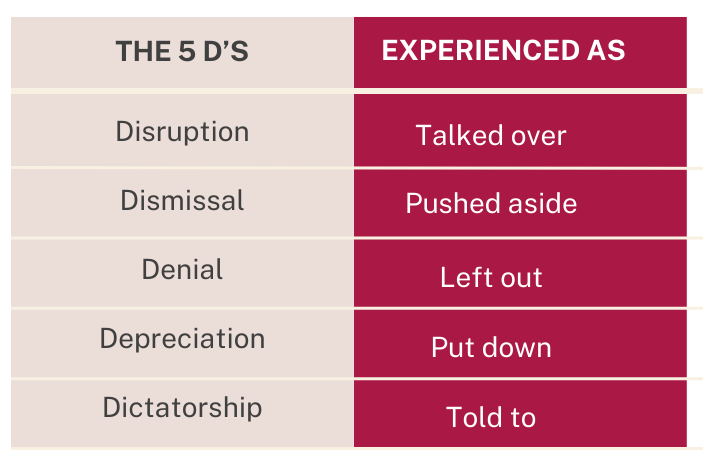Handling Conversation Domination
The 5D’s that Silence Your Voice
Conversation domination is a common way your voice, and self expression, are silenced.
When someone talks on and on without stopping for breath, or to acknowledge you might have something to say, it's like they're over-stuffing a suitcase. Their words get packed in and in and in, until there's no room left - your voice, and anybody elses in their presence, is left out.
Research shows this experience occurs commonly.
For example, in a typical workplace meeting of six people, two do more than 60% of the talking. When the size of the group increases to eight, three do 70% of the talking.
This means two thirds of those present are not heard.
If you identify as female, you could be one of them. In mixed groups, it's only when the majority of people present are women (say 4 out of 5), that they take up the same amount of air time as men.
Without active awareness, the conversational status quo, where a minority of voices dominate, will continue
The challenge this presents is two fold.
Firstly, when you're on the receiving end of a waterfall of words you either walk away feeling unseen and disconnected, zapped of energy, or frustrated for being so patient and letting the person dominate your time. It gets to you on the inside and you feel out of synch with your authentic self.
Secondly, the workplace, organisation or relationship you're in, develops biases and those biases are tipped in the favour of the person or people who speak.
As Robert Brown said "If you can speak, you can influence."
If you can't, or you don't find a way, you won't have influence. You will drift through life like a sail boat without a rudder - taken in whatever direction the wind happens to be blowing.
So how do you handle conversation domination and re-claim your voice?
The thing is that someone dominating the air time is only one way you're not heard.
Whenever you're not invited, ignored, or criticised in front of others, you're experiencing pushback connected to your voice.
In my new book Why Smart Women Don't Speak Up (coming in 2024!), I classify these as the 5 D's of Conversation Domination, as outlined below.
To expand further:
1. Disruption - this is the common experience of being talked over, predominantly by being interrupted when you're in the middle of expressing yourself.
2. Dismissal - this is when you are pushed aside. You may experience this as leaning in, or putting your hand up in an effort to speak but being ignored - as if you don't exist.
3. Denial - this is the experience of being left out of the conversation. It could show up as not being invited to a relevant meeting, being asked to leave at a certain point, not being copied on an email or someone telling you they don't have time to listen to you.
4. Depreciation - this occurs when your contribution is criticized, particularly in front of others. This brings up feelings of shame, one of the most insidious ways you can experience silencing.
5. Dictatorship - this is the experience of consistently being told what to do, without any room for your own contribution or independent thinking and decision-making. It's like being under the rule of a dictator.
The first step toward handling conversation domination is awareness. Notice when the 5D's pop up for you. You'll often feel it in your body - like tightness, disconnection, anger, frustration or aloneness.
When you do notice it, experiment with pushing back.
Put your hand up and keep it up.
Gesture with your hand that you haven't finished speaking.
Let others know you would like to attend the meeting.
Be proactive and organise a time to speak with the person you want to share your thoughts with.
Let others know you don't need their unsolicited advice - you'd like to take the time to make your own decisions.
Being aware of when you're on the receiving end of dominating behaviours that keep your voice small and silent, is a useful step toward beginning to grow your influence by taking up your own space and reclaiming your voice.

